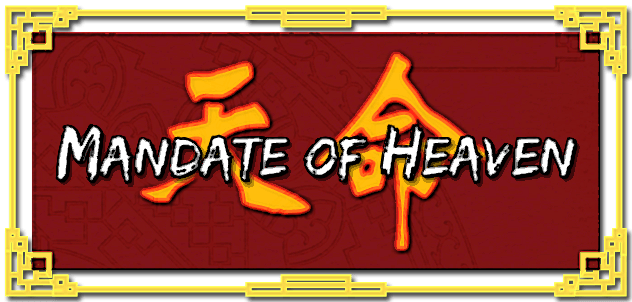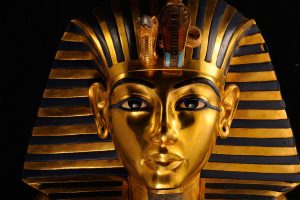According to historians, the Shang Dynasty in China lasted from 1766 to 1122 B.C.E., and it had a big impact on setting the fundamental characteristics of early Chinese society, which we know today thanks to the written records and material remains that they left after their dynasty came to an end.1 Immediately following the Shang Dynasty was the rule of the Zhou. Much of those records and remains have given us insight into the cultural features of Chinese society during the Shang Dynasty; however, methods of law, justice, and administration under the Shang rulers is not well known. The Zhou Dynasty has provided us better and clearer information regarding the way that Zhou rulers ran their society.2 One excellent example of Zhou Dynasty ruling practice is their ideological pronouncement known as the Mandate of Heaven.
The Mandate of Heaven was a set of principles that the Zhou dynasty outlined that would have a relevant influence on the way the Chinese thought about government and politics until the twentieth century.3 The Zhou rulers put forward the Mandate of Heaven idea as a way to display their theory of politics. This theory is interesting, and quite different from that of most ancient world dynastic rulers. The Zhou rulers used the Mandate of Heaven as their justification for their rule, and it served as proof of their theory that Heaven (Tian) had withdrawn the mandate to rule from the Shang dynasty and had bestowed it instead on the Zhou dynasty because of the misrule of the Shang rulers.4 Historians have found evidence that the Zhou dynasty’s overthrow of the Shang rulers was largely justified by the claim that they had received a mandate from Heaven to do so.5 Because the Zhou dynasty rested its justification for overthrowing the Shang rulers on this supposed mandate, that Mandate subsequently came to be seen as the primary justification for all new dynasties throughout China’s long history.

The major message of the Mandate of Heaven was one that explained the politics of the time; the concept behind the Mandate of Heaven was that political leaders were given their power by a divine Heaven, a divine consent without which a man could not be considered a legitimate ruler.6 This message is obviously very powerful, and upon closer examination of the mandate and its relationship to the Zhou dynasty, it becomes quite evident that the Zhou rulers used the mandate as a novel means to justify their overthrow of the previous rulers of China. The message outlined in the Mandate also served another purpose, as observed by historians: the mandate issued a message to the Chinese people about the importance of being a good ruler.7 Many believe that the mandate existed with the sole purpose of reminding the people in ancient China that the Zhou had been chosen by Heaven to be rulers because they were worthy of acting in the right way.8 In other words, the Zhou practiced what they preached; they told their people that Heaven believed them to be the most fit to rule China, and they proved that to be accurate by acting as good rulers, at least for a time.
The Mandate of Heaven can easily be seen as the most important political statement made by the Zhou dynasty because of its ability to justify their coming to power and the fact that the early Zhou leaders followed through on the claim. Moreover, the Mandate of Heaven provided a certain view of Chinese history, that is, the view that Chinese history is cyclical. Once the Mandate of Heaven was first issued, it became a norm for each new dynasty to claim they had received the mandate, begin their rule by acting in the right way, but ultimately become complacent and fail as a dynasty. Overall, the mandate was an important idea to the people of ancient China who lived under the rule of the Zhou, or under the rule of all the subsequent dynasties that claimed to have been bestowed with the same Mandate of Heaven.
- Jerry H. Bentley, Herbert F. Ziegler, and Heather E. Streets-Salter, Traditons & Encounters: A Brief Global History From the Beginning to 1500, Fourth, vol. 1 (New York: McGraw-Hill Education, 2016), 55. ↵
- Bentley, Ziegler, and Streets-Salter, Traditons & Encounters, 55. ↵
- Bentley, Ziegler, and Streets-Salter, Traditons & Encounters, 55. ↵
- Dingxin Zhao, “The Mandate of Heaven and Performance Legitimation in Historical and Contemporary China,” American Behavioral Scientist 53, no. 3 (November 1, 2009): 419. ↵
- Dingxin Zhao, “The Mandate of Heaven and Performance Legitimation in Historical and Contemporary China,” American Behavioral Scientist, 419. ↵
- Bentley, Ziegler, and Streets-Salter, Traditons & Encounters, 55. ↵
- Dingxin Zhao, “The Mandate of Heaven and Performance Legitimation in Historical and Contemporary China,”American Behavioral Scientist, 419-20. ↵
- Dingxin Zhao, “The Mandate of Heaven and Performance Legitimation in Historical and Contemporary China,”American Behavioral Scientist, 419-20. ↵



53 comments
Alexandria Martinez
This was a very insightful and well written article, I had learned a bit about the Mandate of Heaven in high school but there were still things that I did not know that I learned in your article. It is interesting that the Zhou dynasty actually followed through with being good leaders because sometimes rulers say one thing based on their ideals but when it comes time to rule they do the opposite.
Alexis Renteria
Earlier today I was reading a chapter about the early Chinese dynastys and I learned a lot about the Shang dynasty, the Mandate of Heaven and just how much of a role it played in the dynastys. I even learned about one of the Shangs king who succumbed to drinking lots of wine and grew obsessed with women that many of the towns and political districts transferred their loyalties to the Zhou dynasty. This just goes to show how much the Mandate of Heaven meant to both the rulers and the people being ruled.
Liam Gillooly
This article is thoroughly researched and knowledgeable. The methods by which a society assume control are often ingenious, and convincing the masses of a divine right is interesting to say the least. Sometimes I wonder why commoners would never question this bizarre mandate. It gives a better insight into the daily lives of Zhou people, and the way they thought. Overall, great article.
Ryann Cervantes
Great article. By the title I assumed it was something based more on a religion like Christianity but the picture grabbed my attention since it gave the impression the story was of a Chinese origin. I find it interesting that the Mandate was used almost as a tool to gain and keep power, but was ultimately used against the same people who had used it to rise to power.
Steven Clinton
Interesting article, the heaven’s mandate of heaven served more as a political statement than a divine message from God. Each dynasty would use the heaven’s mandate to justify their taking over of the government. The name heavens mandate was just the inauguration of the next dynasty. It’s interesting how the people of China just accepted the takeover without violence. Great article!
Samuel Sanchez
Interesting article. I did not know that the Mandate of Heaven was the Zhou justification for overtaking the Shang Dynasty. The explanation that this mandate from heaven and given to them so it was their right or time to be the new rulers of China. The picture of the Mandate of Heaven cycle was a good illustration of how the mandate would work.
Sergio Cervantes
We were discussing this in my history class so it was nice to read up on it. This information shows how powerful a ruler can be if they prove their legitimacy. The Mandate of Heaven was what gave them that power; it made them godlike and demanded extreme forms of reverence from the subjects. It is fascinating to read how they used this to justify their overthrow of a dynasty. This article also provided an insight as to how politics of other past states formed.
Salvador Rodriguez Gomez
I liked the intro paragraph and how you first started of with talking about the Shang Dynasty. This article was really informative and a great read. I can’t help but winder if the Zhou leaders actually believed in this Mandate of Heaven or if they simply created it to justify their actions.
Maalik Stansbury
I like how there was a form of respect and dignity in with being a politician. They were thought of something superior in a high orderly way. I think the information provided was excellent and caught my attention. Great job explaining the information and creating a form of story being present/ style
Dana
Well done Victoria!